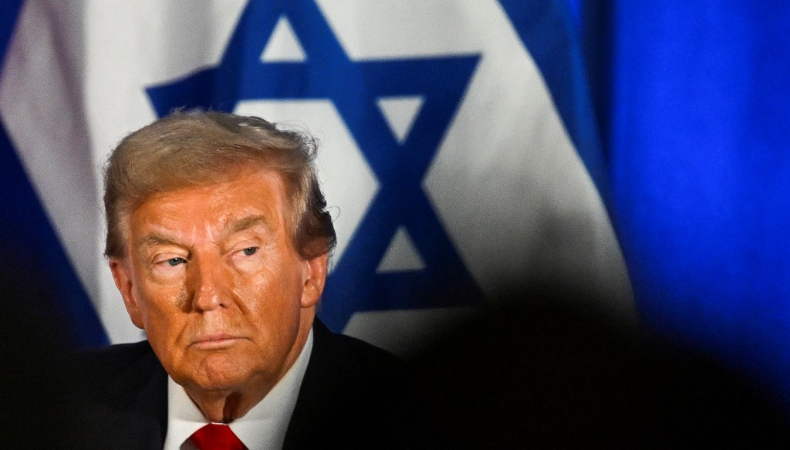Erdogan Urges Trump to Halt U.S. Arms Support to Israel to End Conflict in Gaza and Lebanon

Turkey’s President Tayyip Erdogan begged for peace in the Middle East and urged U.S. President-elect Donald Trump to intervene forcefully to stop the growing conflict involving Israel, especially in Gaza and Lebanon. Emphasizing that Trump’s intervention might start with stopping U.S. arms supplies to Israel, Erdogan underlined that this is a crucial first step in limiting Israeli military operations seen as forceful moves against Palestinian and Lebanese territory.
Speaking to reporters on a return trip from Budapest, Erdogan underlined his hopes for Trump’s government to help to moderate and reduce continuous tensions. He pointed to Trump’s past promises to settle international disputes and said he thinks he has a chance to promote stability by asking Israel to stop its present activities.
“Trump has made pledges to resolve disputes… We want that promise to be honored and for Israel to be warned to “stop’,” Erdogan said. His remarks highlight Turkey’s stance that cutting off the U.S. supply of armaments to Israel, which Erdogan proposed would limit Israel’s military involvement and lower regional tensions, would be a fundamental first step to help to lower violence in Gaza and Lebanon.
Turkey’s Clear Position Against Israeli Activity
Turkey has consistently denounced Israeli military operations, calling attention to what it believes to be too forceful actions in Gaza and southern Lebanon. Other Turkish politicians including Erdogan have said Israel’s actions are irrational and against international law. Turkish officials claim that these activities aggravate conflicts and worsen the humanitarian situation in Palestinian territories, especially in Gaza, where civilian infrastructure and lives are routinely affected.
Turkey’s criticism of Israel’s military operations goes beyond public comments. In reaction, the Turkish government has specifically stopped commerce with Israel and applied to join a genocide case brought before the International Court of Justice. Turkey’s stance on the degree of the Israeli attack is reflected in the accusation of genocide; Israel has constantly denied these allegations, contending that its actions are self-defense mechanisms meant to neutralize threats presented by militants working from Gaza and Lebanon.
The possible influence of Trump’s Middle Eastern Policy
Regarding the wider consequences of Trump’s Middle East strategy, which he feels might either stabilize or destabilize the area more, Erdogan also voiced worries. Longstanding conflicts between Israel and Palestinian areas will probably affect Trump’s position on important topics, including U.S. military support and diplomatic policies, so determining the course of the area. Erdogan cautioned that continuance of present U.S. policies could aggravate the deadlock and prolong cycles of violence; so, Trump should take diplomatic and reasonable consideration that would result in significant communication between Israel and Palestinian officials.
“Trump’s policies will seriously affect the political and military balance in the Middle East,” Erdogan stated. < A continuation of present U.S. support for Israel without conditions or limitations will only “deepen the deadlock in the region,” he said, therefore spreading strife rather than promoting the peace the U.S. president-elect has previously urged.
Changing Dynamics in U.S.- Turkey Relations
Recent remarks by Erdogan imply possible changes in U.S.- Turkey relations under the upcoming Trump government. Turkey has long been a major NATO friend for the United States, but relations between the two nations have lately been strained. Key points of conflict include Turkey’s military operations in Syria, how it treats Kurdish fighters, and different opinions on U.S. foreign policy toward Israel and Palestinian territory. Erdogan’s pitch to Trump implies that, should the U.S. adopt a more measured approach in the Israeli-Palestinian problem and reduce unwavering support for Israel’s military, Turkey might be open to a reinterpretation of relationship.
For Erdogan, Trump’s readiness to change U.S. engagement in Israeli operations and backing for Israel’s defensive capabilities marks a litmus test for the direction of U.S.-Turkey relations. Should Trump give diplomacy first priority and cut American armaments shipments to Israel, it might lead to closer alignment with Turkey on Middle Eastern policy. On the other hand, continuation of present practices would strain bilateral relations much further and widen divisions inside NATO and other international alliances.
The demand of Erdogan for the United States to handle its relations with Israel in a less military manner might have far-reaching consequences Should Trump follow Erdogan’s advice, traditional U.S. policy—which has usually supported Israel’s right to self-defense—would undergo a major change. Particularly with regard to military aid and diplomatic support, Turkey’s stance also fits that of numerous other Middle Eastern nations who support a more balanced and limited approach to U.S.-Israel ties.
Such a change could inspire other countries to seek diplomatic answers in areas of conflict, therefore promoting more general efforts toward durable peace and maybe de-escalation in the area. Any decline in support for Israel, however, would be a difficult and maybe divisive choice for the U.S. government given the longstanding alliance between the two countries and close military cooperation. Domestic supporters as well as foreign partners who see Israel as a vital ally in preserving Middle Eastern stability could object.
Looking Ahead: Middle East Stability Vision of Erdogan
Erdogan’s remarks remind us of the expectations and worries of U.S. friends and regional partners as the Trump government gets ready for take-off. The results of American policy decisions will surely determine the course of the Israeli-Palestinian issue, therefore impacting not just U.S.-Turkey ties but also the dynamics of power and diplomacy throughout the Middle East.
Conflicts in Gaza and Lebanon show no indications of abating, so Erdogan’s call underlines Turkey’s wish for U.S. leadership that gives diplomatic remedies top priority over military operations. Particularly with relation to arms backing and diplomatic pressure on Israel as well as his interaction with Turkey and other Middle Eastern countries supporting peace and stability, the world will be keenly observing how Trump’s policies develop.




